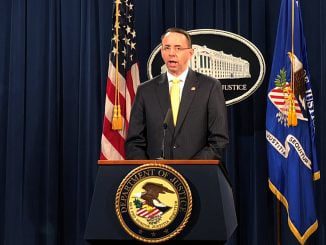Seeking to tighten the financial squeeze on Russia over its war against Ukraine, governors and lawmakers in numerous U.S. states were taking actions Monday to pull state investments from Russian companies while encouraging private entities to do the same.
The effect of sanctions by U.S. states often pales in comparison to national ones, but state officials said they wanted to show solidarity with Ukraine and do what they could to build upon the penalties imposed on Russia by the U.S. government and other Western nations.
On Monday, North Carolina Gov. Roy Cooper signed Executive Order No. 251 in response to Russia’s invasion of Ukraine that directs state government agencies and departments to review all existing contracts and operations and to terminate any agreements or operations that directly benefit Russian entities.
“The invasion of Ukraine is an attack on a free people. This order sends a strong message and helps ensure no public dollars or operations from North Carolina will benefit Russia and its unjustified aggression,” said Governor Roy Cooper. “Our state stands in solidarity with the people of Ukraine as they fight courageously against a tyrant to defend their country, their democracy and their freedom.”
The Executive Order covers all state government agencies and departments over which the governor has executive authority, as well as state entities for which the governor appoints the chief executive or a majority of the board members.
Other state entities and local governments in North Carolina are strongly encouraged to adopt similar policies, including divesting from Russian assets to ensure that public dollars and operations do not benefit Russia and avoiding new contracts with Russian entities.
The order will affect alcohol sales by directing the North Carolina ABC Commission to review its list of approved products for any produced by Russian entities and to suspend the approval of such products as quickly as possible. The order also affects purchases and contracts with the state, and directs the N.C. Department of Administration to identify and terminate contracts with Russian entities.
Currently available information from the North Carolina ABC Commission suggests that three alcohol brands – Hammer & Sickle, Beluga, and Russian Standard – would be subject to this Executive Order.
Many other states are following suit. Georgia House Speaker David Ralston, a Republican, got a bipartisan standing ovation Monday when he told representatives he would seek to have the state’s retirement funds quickly divested from any Russian assets.
“I don’t know about y’all, but I don’t want one penny of Georgians’ money going to subsidize Vladimir Putin,” Ralston said. “While our role in international affairs is limited, we make clear we stand with those who want to live in peace.”
Some actions have been largely symbolic. The capitols in Arizona, Pennsylvania and Tennessee and the governor’s mansion in South Carolina were lit with the blue and yellow colors of Ukraine’s flag. Minnesota Gov. Tim Walz, a Democrat, and Ohio Gov. Mike DeWine, a Republican, issued a joint statement condemning Russia’s invasion of Ukraine as co-chairs of the presidentially appointed Council of Governors. Oklahoma’s Republican-controlled Senate passed a resolution affirming the historical ties between the state and the people of Ukraine and supporting their fight against what it described as “an illegal and violent” Russian invasion.
New York Gov. Kathy Hochul signed an executive order Sunday forbidding her state from doing business with Russia. She ordered state agencies to divest money and assets from companies or institutions aiding Russia in its war against Ukraine. The Democratic governor also said New York would welcome Ukrainian refugees, noting that New York already is home to the largest Ukrainian population in the U.S.
Two prominent Republican governors, Florida’s Ron DeSantis and South Dakota’s Kristi Noem, who are widely seen as angling for a White House bid, mostly took aim at President Joe Biden rather than issuing executive orders targeting Russia. They criticized his energy policies and said that had made it difficult to slap sanctions on Russia’s exports of oil and gas.
Other governors are seeking to sever good-will relationships between their home states and those in Russia.
Republican Gov. Larry Hogan announced Monday that he’s dissolving Maryland’s decades-old sister-state relationship with Russia’s Leningrad region after the invasion of Ukraine. Virginia Gov. Glenn Youngkin, a Republican, asked the cities of Norfolk and Roanoke to end their sister city partnerships with Russian cities. Iowa Gov. Kim Reynolds, a Republican, called for an end to its sister state relationship with Stavrapol Krai, Russia, and a strengthening of its sister state relationship with Cherkasy Oblast, Ukraine.
Several states have expressed a willingness to provide housing to Ukranian refugees. The Washington state House and Senate each have added amendments to their budget proposals setting aside $19 million to provide services and temporary housing to refugees who come from Ukraine.
Texas Gov. Greg Abbott, a Republican, posted on Twitter over the weekend that he has asked restaurants and retailers “ to voluntarily remove all Russian products from their shelves.”
NSJ staff contributed to this report.



